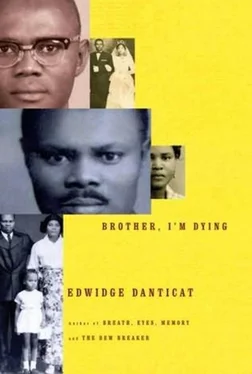During the biopsy, for which my uncle was given no more anesthesia than he might have gotten at the dentist’s office while having a tooth removed, he opened his mouth so wide that his face and neck throbbed. Lying there as the doctor clipped a piece of flesh from the back of his throat, he wished he could go back home and have one final conversation with his wife. He also wanted to preach one last sermon to his congregation, speak on the phone with his son and to my father in New York.
That evening, after the biopsy, my uncle lay in a hospital bed, unable to speak. Would his voice ever come back? He wrote that question on little pieces of paper the nurses gave him. They told him once more that this time it would, but probably not when he had the actual operation.
The next morning, the doctor explained through another translator that the tumor was cancerous. He needed a radical laryngectomy. His voice box would eventually have to be removed. Yes, he would most certainly lose his voice.
After the doctors left his bedside, my uncle became aware that someone in the hospital bed next to his had a small transistor radio, which was tuned to the same station where he’d first heard about the American doctors. The station had a charter studio on the hospital premises and the sound was coming through loud and clear. Over the airwaves, he heard among the lists of announcements about missing people and lost objects a voice saying, “Reverend Joseph Nosius, please come home. Your family is worried about you.”
My uncle was staring at the ceiling and wondering whether the doctors with their “biopsy” had done him more harm than good when he heard the announcer’s voice. It reminded him how important voices were. If you had one, you could use it to reach out to your loved ones, no matter how far away. Technological advances could help-the telephone, the radio, microphones, megaphones, amplifiers. But if you had no voice at all, he thought, you were simply left out of the constant hum of the world, the echo of conversations, the shouts and whispers of everyday life.
As he lay there, listening to the other patients talk to the doctors and nurses, to their family members and to each other, it occurred to him that after the operation, he would never again be able to preach a sermon or scream for help or laugh out loud at a funny joke. He also knew he had to get word to Tante Denise that he was alive.
Slowly he sat up and wrote a brief message on a piece of paper by his bedside and gave it to one of the nurses to take to the station studio for him. The message simply asked if they could let his wife know that he was all right at the hospital and would be home soon.
When the doctors came back to see him that afternoon, they told him they couldn’t operate and remove the tumor. It was too large and they didn’t have the right equipment for the procedure. They asked if he had any family or friends abroad. He said that both his son and his brother, my father, were living in New York. The doctor gave him a copy of his medical file and wrote a letter for him to take to the American consulate requesting a visa to travel for the surgery.
When my uncle returned home to Bel Air and, in a hoarser voice than he’d left with, tried to explain his diagnosis to his wife, his congregation, and even on the telephone to my father and Maxo, with whom he was planning to stay in New York, no one quite understood it. None of our relatives knew what a radical laryngectomy was. We didn’t even know anyone who’d had cancer. As for permanently losing one’s voice, the possibility seemed so remote that it almost appeared to be a curse that, as some of the members of my uncle’s congregation declared, only American doctors could cross an ocean to put on you. People were either born mute or not. They did not become mute, except temporarily if they were struck with a bad case of shock. Usually those cases could be easily cured with herbal remedies. Why not my uncle’s?
To put everyone at ease, my uncle said that maybe the doctors in New York would know more. Maybe he would discover other options, other solutions. Nevertheless, he gathered all his papers-land titles, everyone’s birth certificates-made out a will, and turned everything over to the daughter of his friend, then twenty-six-year-old Marie Micheline, whom he’d adopted and made his own. He wanted desperately to take Tante Denise to New York with him, but there were two problems. First, she was deathly afraid of flying. Then, because the likelihood of his returning to Haiti increased with his having a wife there to return to, her visa request was denied by the American consulate. Uncle Joseph and Tante Denise hadn’t spent much time apart since he’d broken her calabash thirty-two years before. However, time was of the essence, so he had no choice but to travel without her, even though he feared that he might die and never see her again.
***
In New York, Uncle Joseph had been at his son Maxo’s apartment for barely twenty-four hours when he woke up in the middle of the night with a sharp, throbbing pain in his neck.
Maxo was out with a friend. Uncle Joseph somehow managed to stumble out of bed and over to the only phone in the apartment, which was in the kitchen. He dialed my father’s number. My father was living in East Flatbush, three subway stops, a thirty-minute walk and a fifteen-minute drive from Maxo’s place on Ocean Avenue. My uncle heard a crackling as my father’s phone was picked up.
“Hello,” my father said, his voice creaking anxiously. No good news could ever come at this hour of the night, he told himself.
My uncle pressed his lips as close as he could to the mouthpiece to whisper these three words: “Frè, map mouri.” Brother, I’m dying.
“What’s wrong?” my father asked.
“Gòj,” he replied. Throat.
My father told him to open the front door to the apartment and wait. Then he hung up and called an ambulance. When he called back, Uncle Joseph didn’t answer, so my father got dressed, jumped into his car and sped toward the apartment building where my uncle was staying.
The paramedics made it there before he did. When they arrived, they found Uncle Joseph lying on the floor near the front door, barely conscious, clutching his neck, gasping for breath. They tried to put a breathing tube down his throat, but the tumor was blocking his airway. So while racing toward Kings County Hospital, they performed a tracheotomy, drilling a hole in my uncle’s neck to insert a tube there so he could breathe.
My uncle had his radical laryngectomy the next day. When he came out, he was never able to use his own voice again. He was fifty-five years old.
My uncle’s operation cost around thirty thousand dollars, which was negotiated down and paid for by his American missionary friends.
As my uncle recovered at Maxo’s house, my father advised him to remain in New York for a few months to make sure he was in remission. But he wouldn’t listen.
“What about my church?” he scribbled on a piece of paper. “My wife? Besides, this was not a good first visit to New York. Not enjoyable.”
So as soon as the doctors cleared him a month later, he packed his bags and returned to Haiti.
“Our lives were now even more solidly on different tracks,” my father would later recall. “He believed that his life had been spared for some reason and only in Haiti could he discover why. He could have moved to New York when Maxo and I came and he could have moved after that. But I don’t think he ever really wanted to leave Bel Air for any place in or outside of Haiti.”
What Did the White Man Say?
Itold my parents I was pregnant in my father’s car, on the way to the airport. It was more than a week after I learned my father’s diagnosis. But whenever I found myself alone with him and my mother, I simply couldn’t find the words.
Читать дальше












